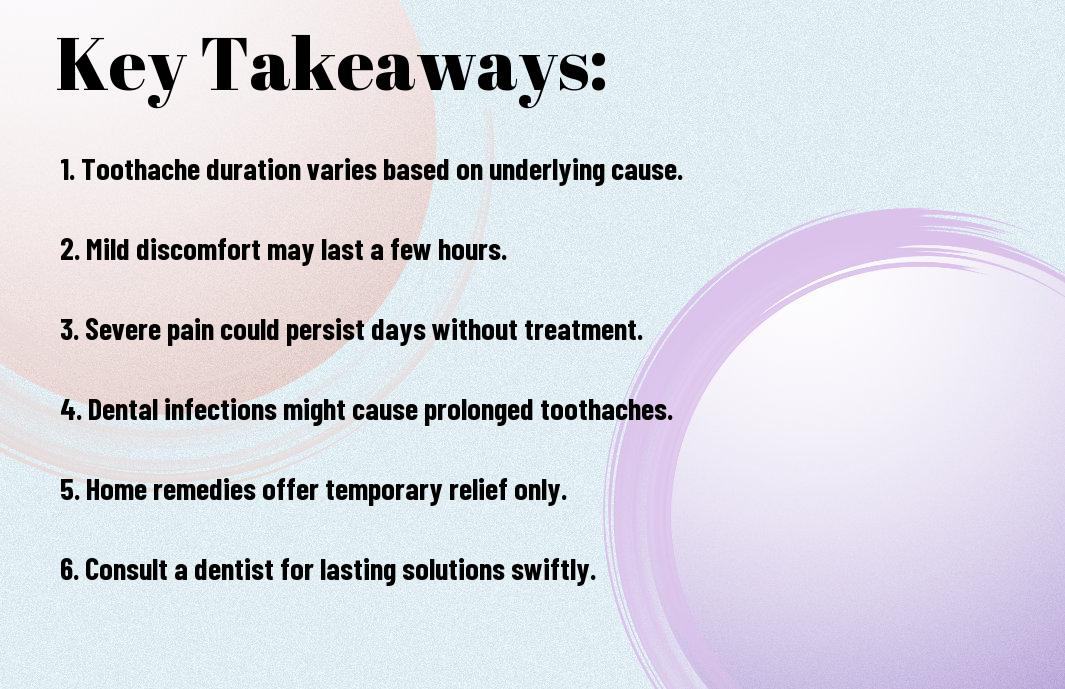You may find yourself wondering how long a toothache lasts, as the discomfort can greatly affect your daily life. The duration of a toothache varies based on its underlying cause, whether it stems from cavities, gum disease, or other dental issues. In this blog post, you will learn about the typical duration of different types of toothaches, when to seek professional help, and tips for managing pain while you wait for treatment. Understanding what to expect can help you take the right steps for your dental health.
Key Takeaways:
- Duration: A toothache can last anywhere from a few hours to several days, depending on the underlying cause.
- Severity: The intensity of the pain can vary; mild discomfort may resolve quickly, while severe pain might indicate a more serious issue.
- Underlying Issues: Conditions such as cavities, infections, or gum disease can prolong the toothache until treated.
- Home Remedies: Temporary relief can be achieved with over-the-counter pain relievers, but professional dental care is necessary for lasting solutions.
- Professional Consultation: It’s advisable to see a dentist if a toothache persists for more than a couple of days or is accompanied by other symptoms.


Understanding Toothaches
Your experience with a toothache can vary significantly based on its underlying cause. Toothaches are usually a sign that something is wrong with your dental health, ranging from mild issues like sensitivity to more severe problems such as infections. To properly address a toothache, it’s crucial to understand its nature and seek appropriate treatment for relief.
Types of Toothaches
Your toothache may manifest in several ways, each indicating different issues. Here’s a brief overview of the types of toothaches you might encounter:
- Sharp pain
- Dull ache
- Continuous throb
- Intermittent pain
- Localized discomfort
This understanding can help you communicate effectively with your dentist.
| Type of Toothache | Description |
|---|---|
| Sharp Pain | Often indicates a cavity or a fracture. |
| Dull Ache | Typically associated with gum issues. |
| Continuous Throb | Commonly linked to infections or abscesses. |
| Intermittent Pain | May result from sensitivity or irritation. |
| Localized Discomfort | Usually focused on a specific tooth. |
Common Causes
Across various individuals, toothaches can arise from multiple underlying issues. Identifying these causes can help you take preventive measures and seek timely treatment.
Causes of toothaches can include dental cavities, gum disease, tooth sensitivity, fractured teeth, or even sinus infections. Understanding these causes can help you determine whether your toothache requires immediate attention or if it can be managed with home care. Regular dental check-ups can significantly reduce the risk of developing toothaches from these common factors.
Duration of Toothaches
You may wonder how long a toothache can persist, as this discomfort can significantly impact your daily life. The duration of a toothache varies widely depending on several factors, including the exact cause and your dental health. Understanding these aspects can help you manage your pain more effectively.
Factors Influencing Duration
On a broader scale, several factors may influence how long your toothache lasts. These include:
- The underlying cause of the pain
- Your overall dental hygiene
- The presence of any dental procedures implemented
- Your personal pain tolerance
- Timing of medical intervention
Any factor that prolongs treatment or exacerbates the issue can extend the duration of your discomfort.
Typical Length of Time
An average toothache may last anywhere from a few hours to several days, depending on its cause and how quickly you seek treatment. Toothaches caused by minor issues such as cavities may resolve quickly once addressed, while pain linked to more severe problems could linger without proper care. Consequently, it’s imperative to attend to any dental pain promptly to minimize its duration and prevent further complications. Taking proactive steps can lead to quicker resolution and a return to comfort.
Home Remedies and Relief
Keep in mind that treating a toothache at home can provide temporary relief while you seek professional dental care. Common remedies include rinsing with warm salt water, using a cold compress on the cheek, or taking over-the-counter pain relievers. These options can help reduce inflammation and ease discomfort, helping you manage your situation more comfortably.
Immediate Pain Relief Options
Beside seeking a dentist, you can try applying a garlic paste or clove oil directly to the affected area for quick relief. These natural remedies possess antibacterial properties that can help numb pain and fight infection. Additionally, placing a tea bag, particularly black tea, can help soothe your gums due to its tannin content.
Long-term Solutions
After addressing immediate discomfort, focusing on long-term solutions is important to prevent recurring toothaches. Schedule regular dental check-ups, maintain proper oral hygiene, and be mindful of your diet to keep your teeth and gums healthy. These practices contribute significantly to overall dental health.
To ensure lasting relief from toothaches, it’s vital to identify and address the underlying cause, such as cavities, gum disease, or teeth grinding. Consulting with your dentist can offer personalized treatment options, including fillings or orthodontic solutions, to prevent future issues. Additionally, consider practicing stress management techniques, as stress can contribute to teeth clenching, leading to discomfort. Investing in your dental health will ultimately save you from pain and inconvenience in the long run.
When to Seek Professional Help
Now that you understand the typical duration of a toothache, it’s imperative to know when to consult a dentist. If your pain persists for more than a few days, worsens significantly, or is accompanied by swelling, fever, or difficulty opening your mouth, you should seek professional help immediately. Delaying treatment can lead to complications, so it’s best to err on the side of caution when it comes to dental health.
Signs of Serious Conditions
Across various symptoms, some may indicate a serious dental condition that requires urgent attention. If you experience intense, throbbing pain, sensitivity to hot or cold that lingers, or visible signs of infection such as pus or severe swelling, these are alarming signs that you should consult a dentist without delay.
Treatment Options
To address your toothache effectively, it’s imperative to explore the available treatment options. Depending on the underlying cause, your dentist may recommend a variety of solutions, from medication for pain relief to procedures like fillings or root canals, ensuring your oral health is restored and maintained.
In fact, the type of treatment you receive will depend greatly on the diagnosis your dentist provides. For minor cavities, a simple filling may suffice, while more severe issues such as infections might require root canal therapy. Additionally, over-the-counter pain relievers can be a temporary measure to alleviate discomfort. By seeking professional help, you can receive a tailored treatment plan that addresses your unique situation and promotes long-term dental health.
Prevention Tips
After experiencing a toothache, you may want to take proactive steps to prevent future discomfort. Here are some effective tips:
- Brush your teeth twice a day with fluoride toothpaste.
- Floss daily to remove plaque and food particles.
- Limit sugary snacks and beverages.
- Drink plenty of water, especially after meals.
- Visit your dentist for regular check-ups and cleanings.
After implementing these practices, you’ll likely reduce your risk of toothaches.
Dental Hygiene Practices
At the foundation of preventing toothaches is maintaining good dental hygiene. You should brush your teeth for at least two minutes, ensuring you cover all surfaces. Flossing helps you eliminate debris between your teeth that brushing alone cannot reach. Consider incorporating mouthwash into your routine for added protection against bacteria.
Lifestyle Adjustments
Between proper dental hygiene, lifestyle adjustments can significantly impact your oral health. You should aim for a balanced diet rich in vitamins and minerals, which support strong teeth and gums. Try to limit acidic foods that can wear away enamel, and consider chewing sugar-free gum to increase saliva flow and neutralize acids.
Prevention of toothaches is about creating a holistic approach to your oral health. This involves making dietary choices that promote tooth strength, such as consuming dairy products for calcium and crunchy fruits and vegetables for natural cleaning. Staying mindful of habits like grinding your teeth, especially at night, can also help. Your overall well-being contributes to the health of your teeth, so make small adjustments to help maintain a pain-free mouth.
Myths and Misconceptions
Unlike popular belief, not all toothaches are caused by cavities. Many people think tooth pain is always a sign of decay, but various factors, including gum disease, sinus issues, or even jaw problems, can contribute to discomfort. It’s vital to recognize these different causes to seek appropriate treatment and alleviate your pain effectively.
Common Misunderstandings
Against common thinking, you might believe that a toothache will simply go away on its own. While some discomfort might diminish temporarily, underlying issues often persist and can worsen over time. It’s vital to consult a dentist rather than relying on the hope that the pain will resolve by itself.
Clarifying Facts
Before addressing a toothache, it’s important to understand that pain duration can vary widely based on the cause. Some conditions may lead to a short-lived ache, while others could result in prolonged discomfort. Seeking an evaluation from a dental professional can provide clarity on the root cause.
To effectively manage your toothache, understanding the specific reasons behind your pain is vital. For example, if the discomfort stems from an abscess, prompt treatment is necessary to prevent serious complications. Conversely, a small cavity might only need a simple filling. Being proactive about your dental health and knowing what to expect can greatly influence your recovery timeline.
To wrap up
So, the duration of a toothache can vary significantly based on its underlying cause. It may last a few hours or persist for days, so it’s vital to pay attention to your symptoms. If your pain continues, seeking professional help is important for proper diagnosis and treatment. For more information on how to manage your discomfort, you can check out Treating Tooth Pain in Chapel Hill, NC | Dr. Furgurson. Taking prompt action will lead you to the relief you need.
FAQ
Q: How long can a toothache last if it is caused by a cavity?
A: If a toothache is caused by a cavity, it can last anywhere from a few hours to several days, depending on the severity of the cavity and whether it has progressed to a more serious infection. Initially, the pain may be intermittent and mild, but as the cavity worsens and affects deeper layers of the tooth, the discomfort can become more constant and intense. It’s advisable to seek dental treatment if the pain persists beyond a couple of days.
Q: What are the potential durations of a toothache related to gum disease?
A: A toothache associated with gum disease can vary in duration. Mild gum inflammation may cause temporary discomfort that lasts a few hours, especially after eating or brushing. However, if the gum disease is advanced and leads to periodontal issues, the pain can be chronic and may last for weeks or even longer if left untreated. Regular dental check-ups can help identify and manage gum disease early on.
Q: Can toothache durations vary based on the type of dental issue?
A: Yes, toothache durations can greatly differ based on the underlying cause. For instance, pain due to a dental abscess can last continuously and intensify over days or weeks, while sensitivity from a recent filling might only last a few days. Other issues such as tooth fractures or sinus infections can also produce varying pain levels and durations. Consulting with a dentist is recommended for accurate diagnosis and appropriate treatment to alleviate pain effectively.






